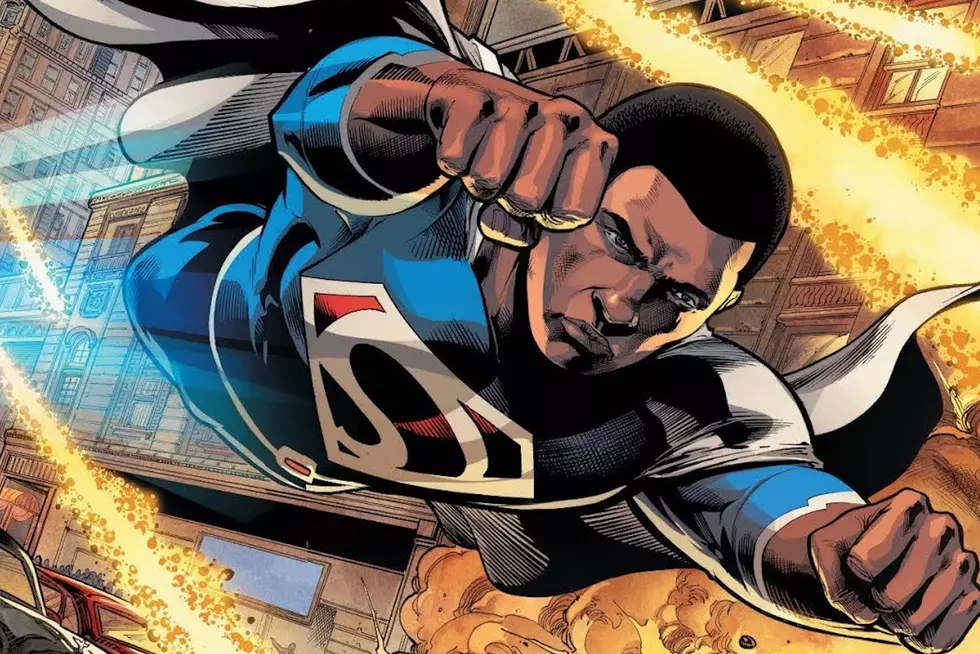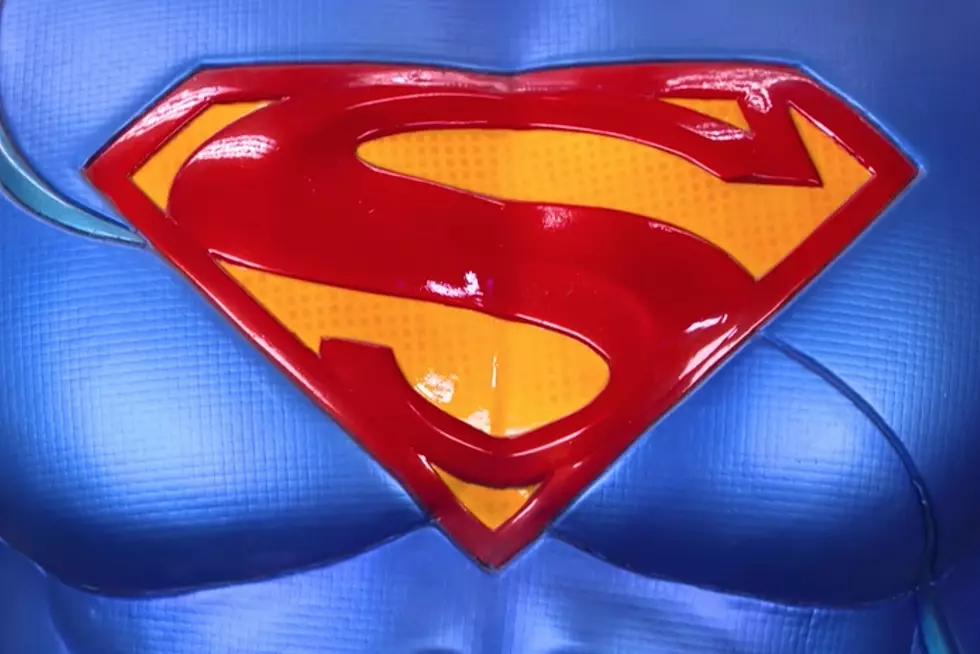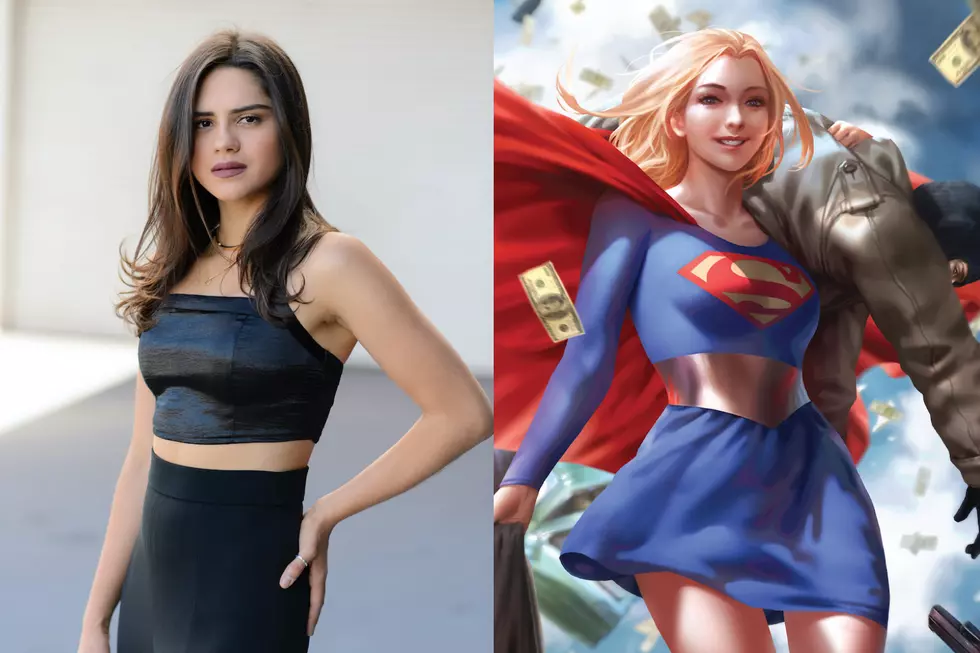
Ask Chris #136: Supergirl, Krypton And How It All (Sort Of) Works
Over a lifetime of reading comics, Senior Writer Chris Sims has developed an inexhaustible arsenal of facts and opinions. That's why, each and every week, we turn to you to put his comics culture knowledge to the test as he responds to your reader questions!

Q: Chris, there have been a wide amount of versions of Supergirl over the years. Which is the best, which is the worst, and what defines Supergirl as a character, in your opinion? -- Gabriel, via email
A: If you've read this column more than, say, once, you've probably already tumbled to the fact that I have a lot of hard and fast opinions about most things in comics. Supergirl, however, is one of the few characters that I'm actually pretty conflicted about. I love so much about what she is and what she represents, but I can't shake the feeling that she breaks some pretty important stuff just by existing. When you get right down to it, Supergirl is one of those concepts that pretty much had to happen, like the Royal Flush Gang or the Wrecking Crew. A gang of villains based on playing cards or a group of super-powered construction workers who just go around tearing stuff up are easy concepts that you can drop into virtually any superhero story. They're visually interesting and inherently dynamic -- they just work, and Supergirl's the same way. She's a teenage girl version of Superman with all of his fantastic powers, but younger, fresher and with the ability to appeal to a different reader. That's an idea that doesn't just sell itself, it's blindingly obvious to the point where I'm always surprised that it took a full 20 years after Action Comics #1 for them to get around to actually doing it. I mean, we had a super dog before we had a super girl, which is pretty much the history of gender dynamics in superhero comics in one sentence.
When you get right down to it, Supergirl is one of those concepts that pretty much had to happen, like the Royal Flush Gang or the Wrecking Crew. A gang of villains based on playing cards or a group of super-powered construction workers who just go around tearing stuff up are easy concepts that you can drop into virtually any superhero story. They're visually interesting and inherently dynamic -- they just work, and Supergirl's the same way. She's a teenage girl version of Superman with all of his fantastic powers, but younger, fresher and with the ability to appeal to a different reader. That's an idea that doesn't just sell itself, it's blindingly obvious to the point where I'm always surprised that it took a full 20 years after Action Comics #1 for them to get around to actually doing it. I mean, we had a super dog before we had a super girl, which is pretty much the history of gender dynamics in superhero comics in one sentence.
But there's a good reason for the delay, too, and it all has to do with how Superman was built. One of the most interesting aspects of his character -- and one that I think is genuinely important for making this godlike character someone that we can relate to and sympathize with -- is that he's the Last Son of Krypton™. He's the only surviving remnant of this civilization, and while he's embraced by Earth and accepted as one of us, raised by kindhearted humans to be the most human of all the superheroes, mentally and emotionally, he'll always have that powerful sense of loss behind him. He needs to.
Peter Parker is an ordinary guy (brilliant, of course, but otherwise ordinary) and all it takes to change his life forever is the loss of one person. Batman is an exceptional human being -- photographic memory, naturally athletically gifted, crazy rich, dope car -- and for him, the loss of two people sends him down a path that I think we can all agree is just a little extreme. But Superman? He's far beyond us mortal men, more powerful than we can even really comprehend. He's bigger, and because of that, he needs something bigger looming behind him. So he loses an entire world.
Think about that for a second: Every single culture, every achievement, every person on the planet Krypton, gone, exploded into dust in the vacuum of space, except for one child. I've never liked stories that treat Superman as an outsider or work on the premise that he thinks of himself as anything other than Clark Kent from Smallville, Kansas, because I think it's just as important that he feels at home on the Earth, and that Superman's morality is just an extension of Clark Kent's, but that's still a powerful burden. He's the last of his kind, and that knowledge is part of the reason he wants to save each and every one of us. He knows how precious our lives are, because in a way, we're all the last of our kind. On Krypton, there was nothing anyone could do to prevent that tragedy, not with all their science. On Earth, Superman can do anything, and what he does is keep us from the same fate as Krypton, whether as a whole or individuals.
That's why I've always hated it when stuff from Krypton pops up in comics, and why I love the poetry of Kryptonite. There's something that just underscores it all by having the only remnants of Krypton be these little chunks of death -- constant, tangible reminders of the fate that befell every single other person on his planet. And it's also why my favorite version of Krypton is the one that John Byrne cooked up in Man of Steel:

It's not the vibrant world of capes and insignias that we saw in the Silver Age. It's a place without emotion. It's a cold world without love, where a husband never touches his wife, and because of that, it's a dead planet long before it explodes. Jor-El's achievement isn't building a rocket that can take his son to Earth, it's that he cares enough to do it, and the fact that his last act is to tell Lara he loves her, a spark of actual life right before it's all destroyed is so metaphorically perfect that it blows my mind every time I read it. It simultaneously makes Krypton a place that you'd never want to see restored or revived, but shows that for all its sterility, it's still a world of people who had the potential to feel and love and laugh, and that it's those emotions that gave us Superman.
For me, that's the magic formula of Superman's heritage: He's isolated as a Kryptonian, but accepted as a human. He loses a planet, but gains another. If I had my way (and it's pretty clear at this point that I don't), he'd never really know a whole lot about Krypton -- just enough to understand that he lost an entire world and that there was a family and a history that he'll never know. Anything more than that is just fetishizing the past, a trick that superhero comics are particularly good at.
 When you combine all of those bits and pieces into a whole, it shows exactly why I don't like it when stuff from Krypton shows up in Superman stories. The Phantom Zone Criminals, Kandor, the pets, and worst of all, the all-knowing floating Jor-El head that showed up in Superman: The Movie and will not stop weaseling its way into comics, movies and TV shows -- they all run counter to that delicate balance of isolation and acceptance. I like a lot of that stuff (you show me someone who doesn't like Krypto and I will show you a heartless monster) but every time one shows up, it pokes a little hole in that aspect of Superman. They tie him back to a dead world while isolating him from the one that's alive right now. Every time you see Jor-El and Lara, you're seeing Kal-El the Kryptonian, not Jonathan and Martha's son who puts on a cape and goes out to help people because he can.
When you combine all of those bits and pieces into a whole, it shows exactly why I don't like it when stuff from Krypton shows up in Superman stories. The Phantom Zone Criminals, Kandor, the pets, and worst of all, the all-knowing floating Jor-El head that showed up in Superman: The Movie and will not stop weaseling its way into comics, movies and TV shows -- they all run counter to that delicate balance of isolation and acceptance. I like a lot of that stuff (you show me someone who doesn't like Krypto and I will show you a heartless monster) but every time one shows up, it pokes a little hole in that aspect of Superman. They tie him back to a dead world while isolating him from the one that's alive right now. Every time you see Jor-El and Lara, you're seeing Kal-El the Kryptonian, not Jonathan and Martha's son who puts on a cape and goes out to help people because he can.
Which, after a diversion that's lengthy even by my standards, brings us back to Supergirl.
Kara Zor-El breaks the isolation/acceptance balance more thoroughly than any other piece of Krypton that's shown up, for the simple fact that she's Superman's equal. The Phantom Zone Criminals are disembodied bad guys who are morally opposed to Superman and will never understand his altruism, Kandor is full of tiny little people who have their own weird thing going on inside a bottle that they're never going to get out of, and Krypto is a flying dog. But Kara? She's just like him. The same origin, the same morality, they even wear the same clothes so that you know just by seeing her that she's a peer. And that changes everything.
Even if it's just the two of them, Superman is no longer alone. He no longer has to carry that burden alone, which means it's no longer shaping his actions as strongly as it had before. It certainly doesn't take away Superman's desire to protect Earth and its people, but still, it affects that side of his personality, drawing the focus back to Krypton.
It's something that alters the fabric of the character, and if you go back and read her first appearance in Action Comics #252, you can see Otto Binder and Al Plastino doing everything they can to minimize it:

Not only do they wrap Kara up in the civilian identity of Linda Lee and ship her off to an orphanage (one of the all time greatest dick moves in the entirety of the Silver Age), but they also make Supergirl a "secret weapon" so that Superman is free to ignore her for however long as he wants. They basically make her somebody else's problem (although if memory serves, that somebody else frequently ends up being Otto Binder and Al Plastino).
By all of this logic, Supergirl should be something that I'd be just fine without, but the thing is, she's a really great character. And it's all because of a few crucial differences between her and Superman.
The biggest one, and the one that I think makes her compelling in a completely unique way, is that she's Kryptonian. For all intents and purposes, Clark Kent is an Earthman -- another thing Byrne did in Man of Steel was make that a literal truth; he wasn't "born" until the Kryptonian Gestation Matrix that Jor-El rocketed to Earth landed in Kansas -- who just has Kryptonian heritage and only learns of the tragedy of his past later, once he's old enough to comprehend what it means. But Kara arrives on Earth as a teenager. She grew up on Krypton, or at least a floating chunk of it. She knows the culture. She knows the history. She can sing Kryptonian songs. And then she watched while the ground below her feet slowly poisoned her family.

That is bleak. Superman's connection to Krypton is a massive, vague sense of loss for a world he never knew, but Kara was a witness to the destruction of her home planet on both a large and a small scale. There's a darkness and a sadness underneath the surface of her character that you don't see in a lot of comics, especially in 1959. And because she was part of that world for her formative years, it makes her an outsider in a way that Clark, growing up in Kansas with a pair of loving parents and friendly neighbors, never was. Her journey to Earth puts her in a new place where she has secrets to guard, and that's genuinely interesting stuff. She's like a prototype X-Man, but in a world that would love her if they only knew she existed.
Don't get me wrong: Supergirl doesn't have to be "dark" or spend her time sulking around and crying about the sad fate of Argo City, but it shifts her perspective. She's Superman's equal in powers and morality, but they can approach the world around them in different ways. Sueprman sees the world around him as delicate and fragile, always ready to collapse if he can't stop it, but for Kara, she's the one in danger of losing everything for the third time. She's holding onto the world, and to Superman, because they're all she has left. It's motivated by what she wants for herself, but it's not selfish. It's passionate, a different kind of love for the world that's rooted in loss rather than the threat of loss, and that's a fascinating difference. The thing that doesn't work for Superman's relationship to Supergirl, the fact that he finally has another connection to Krypton, works beautifully for Supergirl's relationship to Superman, because he's the only connection she has left.
So that, to me, is how Supergirl -- my favorite version, the classic Silver Age Kara Zor-El -- works. And like I said, I'm conflicted. I love everything about her character except how she breaks one of my favorite aspects of Superman, but at the same time, that was already halfway broken anyway. So did we get more than we lost out of that character? Maybe. Loath as I am to say it, I'm not really sure.
Plus, I just like a lot of those old stories. Supergirl and Jimmy Olsen have a great connection in the few times they interact, and she gets up to the single weirdest element of the Silver Age by dating her horse. She did not know he was a horse at the time. It's complicated.
That's all we have for this week, but if you've got a question you'd like to see Chris tackle in a future column, just send it to @theisb on Twitter with the hashtag #AskChris, or send an email to chris@comicsalliance.com with [Ask Chris] in the subject line!
More From ComicsAlliance









